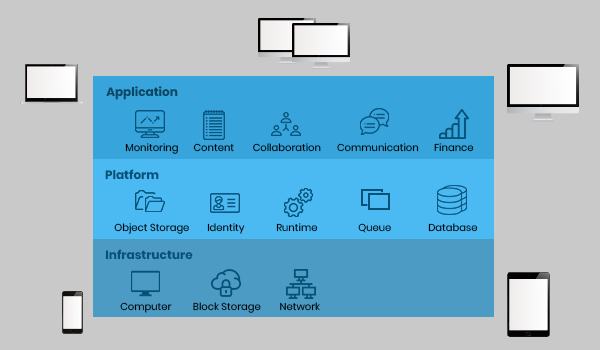Different Types of Cloud Computing Platforms
There are a variety of cloud computing platforms offered by cloud service providers. Specific types of cloud computing platforms are designed to serve particular tasks.
For instance, some cloud computing platforms offer free cloud storage. For this reason, they are designed to be limited and less secure than paid private clouds.
But, despite this diversity of cloud computing platforms, they are the same. The reason for this can be that they all use cloud computing as their base system.
Here are some types of cloud computing platforms that define the character platforms:

Cloud Computing Platforms Based on Service Model
Cloud computing platforms offer a broad range of services. The types of services that these cloud computing platforms use also determine their type.
Cloud computing is a scalable system, which made it adaptable to specific conditions. Businesses in a wide range of sizes and industries have different problems and needs.
Cloud computing caters to these problems and needs by developing various platforms. For instance, free cloud storage and paid storage service exist. The reason for this is to cloud computing could cater to small-scale and large-scale usage receptively. This variety of solutions to various problems gave rise to the diverse cloud computing service models.
- Cloud Computing Platforms in SaaS. Software as a Service or SaaS is one of the most popular cloud computing service models. In this model, applications are developed by third-party providers. These providers made these applications available through the Internet, where users access them. This sort of setup cuts down the need to install these applications on the user’s device. This allows the client to save storage space on the device. Other than that, the client should bear the upgrade and maintenance of the installed app. Though, in SaaS, app upgrades and maintenance are all carried by the provider.
- Cloud Computing Platforms in PaaS. In Platforms as a Service or PaaS, software tools are offered through the Internet. These software tools are usually application development tools. Third-party service providers develop these tools and offered them through the Internet. Users also access them via the Internet. Such a setup of cloud computing platforms cuts down the need to install development tools. This allows for more storage space on the device. These tools are also more comfortable to upgrade and maintain as the service provider still has a hold on them.
- Cloud Computing Platforms in Iaas. In Infrastructure as a Service or IaaS, computing resources are virtualized. Third-party service providers develop computing resources and offer them through the Internet. It is one of the main service models in cloud computing platforms. Computing resources traditionally only exist in on-premise environments. These computing resources contain storage, servers, data centers, and network components. IaaS cloud computing platforms virtualize them. Then, offer them to users through the Internet. In IaaS, infrastructure becomes considerably more scalable than its on-premise infrastructure. Besides, it becomes easier to upgrade and maintain.
Cloud Computing Platforms Based on Proprietorship
Cloud computing platforms are also able to adjust their features based on proprietorship. Different entities or people have different problems and needs. So, cloud computing platforms use their scalability to adjust to individual conditions.
For instance, some businesses do not need much discretion. These businesses would prefer a more liberated flow of information. These businesses include marketing or advertising offices.
Other industries, on the other hand, want a more secure platform. These industries include banking and national security organizations.
For this reason, different cloud computing platforms based on proprietorship developed. This is so that cloud computing could cater to these conditions.
- Cloud Computing Platforms in Public Cloud. Public cloud computing platforms, as the title suggests, make their services widely available. For this basis, the setup of public cloud platforms is much more user-friendly. Most public cloud computing platforms also cost less than other cloud programs. The public cloud is one of the most popular cloud computing platforms. It has one of the largest enterprises among cloud computing platforms today. This is because the public cloud is usually free, freemium, or subscription-based which cost less.Gartner reports that the worldwide public cloud revenue went US$182.4 billion in 2019. The same research firms predict that it will grow to US$214.3 billion in 2019.
- Cloud Computing Platforms in Private Cloud. The private cloud, on the other hand, is the direct opposite of the public cloud. The public cloud is dedicated to more public or widely-available use. A private cloud is a cloud that is used by a single organization. Private clouds are better secure than public clouds as they are not shared with another entity. Only one commodity or a few share a private cloud. Whereas, in public clouds, the platform is shared by multiple entities and users. But private clouds are much more expensive than public clouds because of their exclusivity.
- Cloud Computing Platforms in Hybrid Cloud. Hybrid cloud computing platforms are simply combinations of features on the above platforms. Hybrid clouds have features of a private cloud and a public cloud. Hybrid clouds can be convenient for businesses that want to make use of strong security and cheaper solutions. These businesses will take strong security from a private cloud. Then, they will draw solutions that cost less in public clouds.
ThinkIT Solutions cater to all businesses of all sizes and industries. We offer cloud computing solutions that would cater specifically to your needs. If you are interested in availing your business the benefits of cloud computing, call us at +1 (504) 455-5552. You may also send us an email at info@thinkitsolutions.com.


